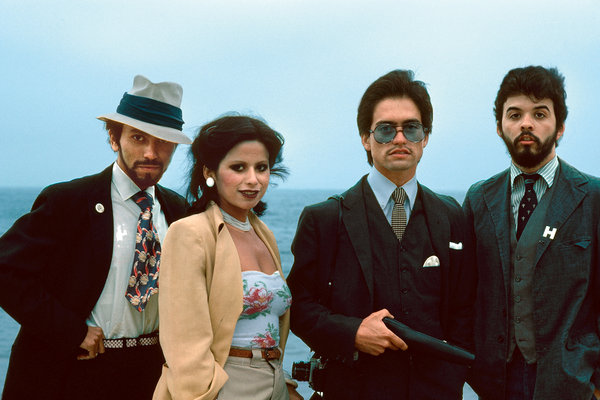- 14 3402-5578
- Rua Hygino Muzy Filho, 737, MARÍLIA - SP
- contato@latinoobservatory.org
 Foto: Harry Gamboa Jr./Cortesia Asa Nisi Masa Films
Foto: Harry Gamboa Jr./Cortesia Asa Nisi Masa Films
The documentary ASCO: Without Permission, directed by Travis Gutiérrez Senger, rescues the trajectory and legacy of the Chicano artistic collective ASCO, formed in the 1970s by Patssi Valdez, Willie Herrón III, Gronk and Harry Gamboa Jr. According to the Associated Press, more than an art group, ASCO represented a cultural and political resistance movement, especially relevant to the Mexican-American community of East Los Angeles. The collective's name, which means "nausea" or "disgust" in Spanish, was a provocative response to the prejudice faced by Chicanos, including within the art world itself.
Barred from exhibiting their work in traditional museums and galleries, ASCO members created their own opportunities, drawing on performance art, urban murals, and public interventions to express critiques of police brutality, systemic racism, and cultural marginalization. One of their most symbolic actions was the graffiti on the walls of LACMA, in protest of the exclusion of Chicano art from formal institutions. Over time, the members of the group became important names in art in the USA, although they took time to be officially recognized — only in 2011, LACMA organized a retrospective of the group.
The presence of Patssi Valdez, the only woman in the group, gains special attention in the documentary, after years of invisibility within the narratives about ASCO, according to the publication. She recalls how she faced both racism and sexism — including within her own community — and how her performance art was a form of resistance to these pressures. A striking example is the performance "Instant Mural", in which she taps herself to a wall, symbolizing the censorship imposed on women.
The influence of pop culture and Hollywood cinema is another element present in the collective's work, albeit in a critical way. The series "No Movies" satirized the absence of Latino representation in the film industry, recreating fictional scenes with movie aesthetics, but with Chicano protagonism. This irreverent and challenging spirit inspired Senger's documentary, which also pays homage to ASCO by including young Latino artists in DIY-style short films.
Produced by Gael García Bernal and Diego Luna,
the film is still seeking distribution, but it is already having an impact
among new generations of Latin artists. With testimonials from the likes of
Michael Peña and Arturo Castro, ASCO: Without Permission underscores the
importance of telling Latin American stories that have been historically
ignored. For ASCO members, art was, and continues to be, an instrument of
affirmation, resistance, and freedom—a way of saying that one does not need to
ask permission to exist, create, or manifest.











